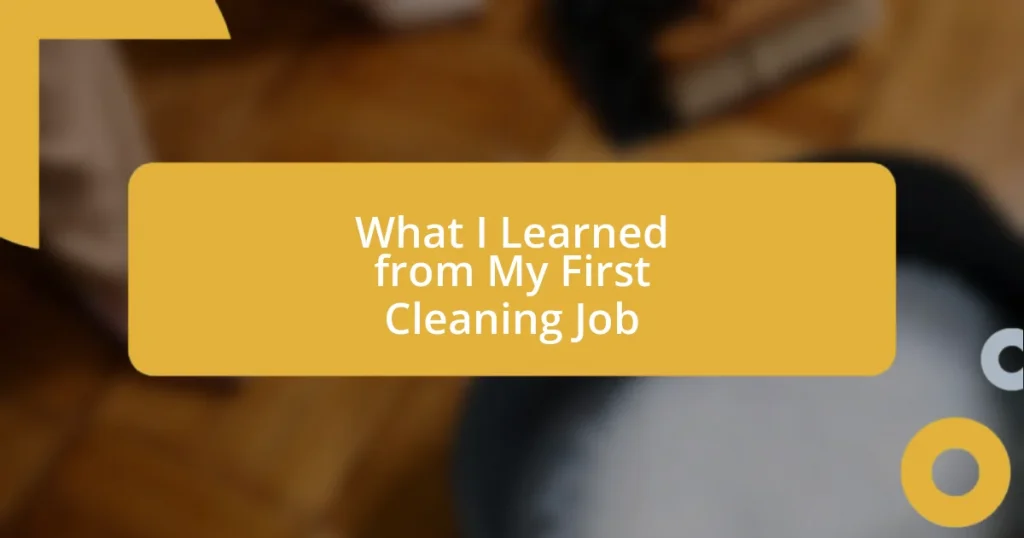Key takeaways:
- First impressions matter; a positive attitude and genuine smile can greatly influence client perceptions and relationships.
- Understanding client needs, preferences, and effective time management are crucial for providing excellent cleaning services.
- Building strong customer relationships through open communication, attention to detail, and personal connections enhances client satisfaction and trust.
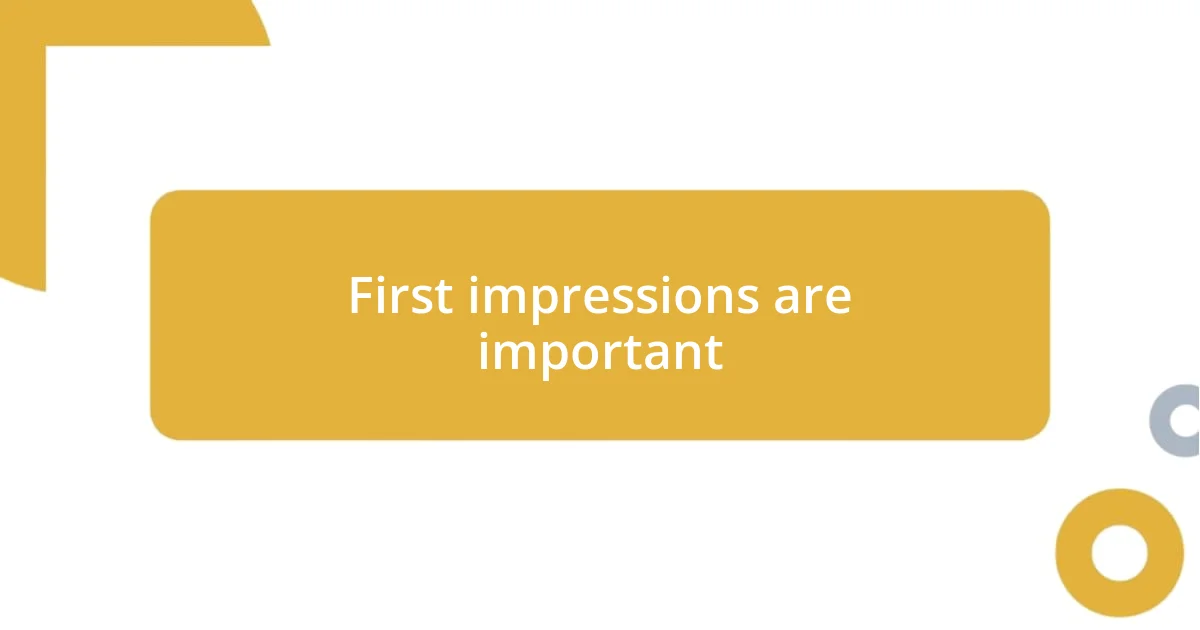
First impressions are important
When I arrived for my first cleaning job, I remember feeling a mix of excitement and anxiety. The initial sight of the home, with its clutter and dust, made my heart race. I thought, “What will they think when they see me?” This overwhelming pressure stirs up those familiar feelings of self-doubt we all face, especially in new environments.
The moment I started working, I realized that my attitude would set the tone for their perception. If I walked in with confidence and a bright smile, I noticed the clients relaxed more. This made me wonder: How often do we underestimate the power of a simple greeting or a genuine smile in creating a welcoming atmosphere?
In the end, I discovered that first impressions extend beyond just appearances — they encompass energy and attitude. By focusing on creating a positive and professional vibe, I learned the value of leaving a lasting imprint. Isn’t it fascinating how that initial interaction can influence not only their opinion of you but also the entire relationship moving forward?
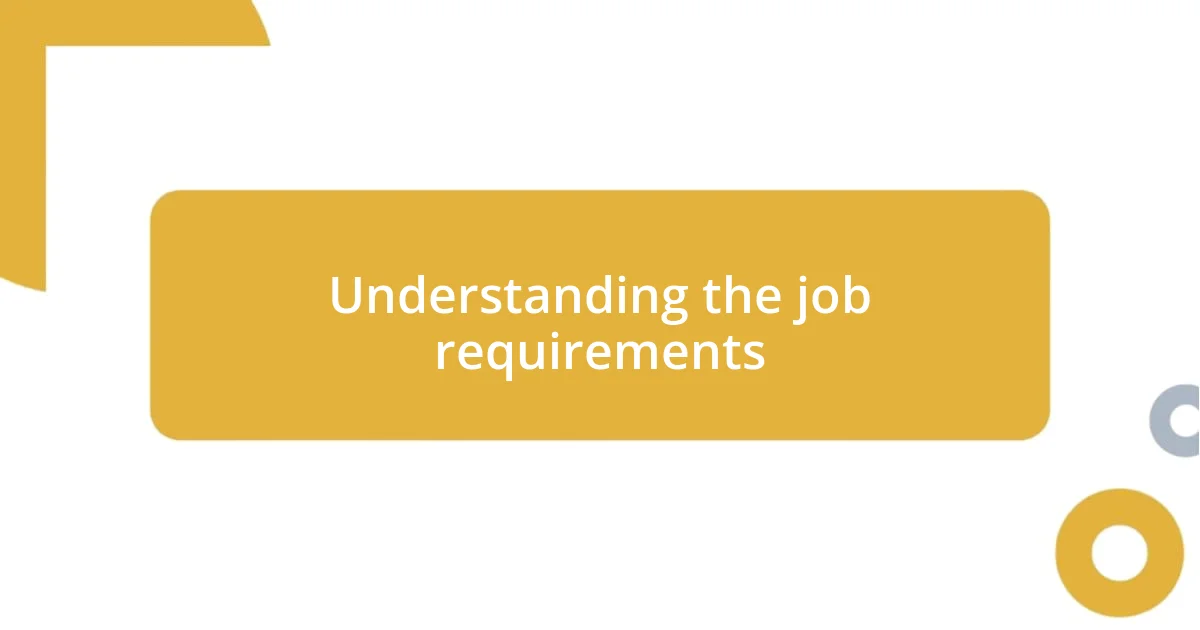
Understanding the job requirements
Understanding the job requirements is crucial. I quickly learned that being a cleaner isn’t just about mopping floors or dusting surfaces. It’s about understanding what each client expects and how you can exceed those expectations. I remember one instance where the homeowner had particular concerns about their allergies, which required me to use specific, hypoallergenic cleaning products. It dawned on me how vital it was to ask questions beforehand and really listen to their needs.
Here are some key aspects of job requirements I discovered:
- Familiarize yourself with the home’s layout and any specific areas that need attention.
- Understand client preferences, from cleaning products to methods.
- Be aware of any special requirements, such as allergies or pets.
- Maintain a professional demeanor and communicate clearly.
- Time management is essential; know how long each task realistically takes.
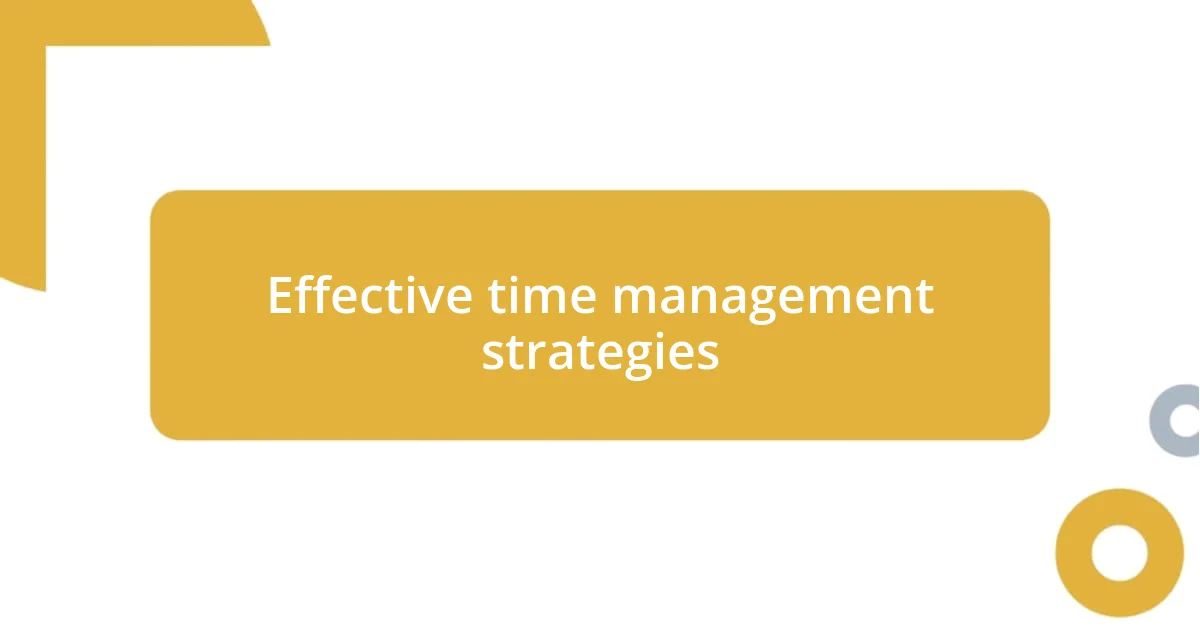
Effective time management strategies
Managing time effectively in a cleaning job becomes crucial as it directly impacts the quality of work and client satisfaction. I remember my first day, where I didn’t account for how long certain areas would take. I underestimated the bathroom, thinking it would be a quick scrub. After spending nearly half an hour more than planned, I felt the pressure. It made me realize how vital it is to set realistic time estimates for each cleaning task.
As I honed my skills, I discovered several strategies that truly made a difference. One key approach was to create a checklist. This not only guided my work but also helped me visualize the tasks. Checking things off as I went fostered a sense of accomplishment. Another effective method was to prioritize tasks based on urgency and visibility. For instance, starting with the kitchen, which is the heart of many homes, often had the biggest impact on how satisfied clients felt.
I also learned the value of using a timer. I started setting short intervals for each task. It kept me focused and motivated, almost like a game. This technique helped me maximize efficiency while providing a sense of urgency. Have you ever tried this? It’s remarkable how a little pressure can spark productivity. By reflecting on these strategies, I found that managing time well not only made my job easier but also left clients happier with the results.
| Time Management Strategy | Description |
|---|---|
| Task Checklist | Guides work and provides a visual sense of accomplishment. |
| Prioritization | Focus on the most visible and urgent tasks first. |
| Timer Technique | Sets short intervals for tasks, boosting efficiency and motivation. |
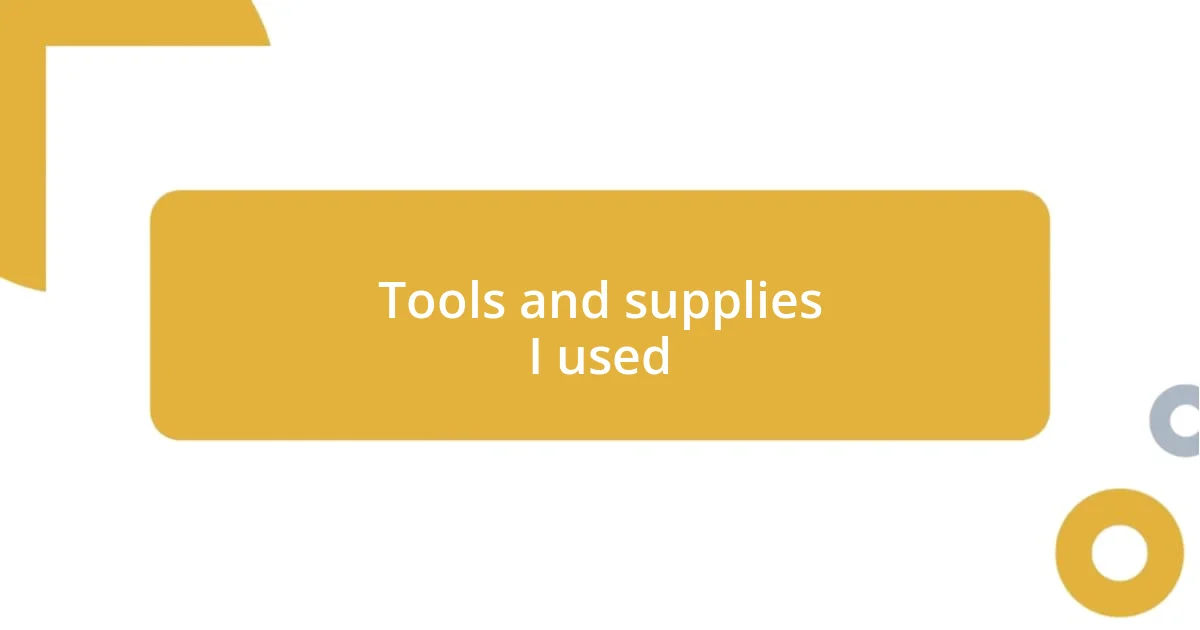
Tools and supplies I used
When I think about the tools and supplies I used during my first cleaning job, a mixture of excitement and anxiety comes to mind. I remember standing in the cleaning aisle of a store, feeling overwhelmed by the sheer number of options. Ultimately, I chose distilled white vinegar and baking soda as my go-to essentials. Not only are they effective natural cleaners, but I also loved knowing I was using items that were safe for my clients and their pets. Have you ever wondered how powerful simple ingredients can be?
Armed with my trusty microfiber cloths and a bucket of warm water, I jumped into the task. The microfiber cloths were a game changer; they picked up dust like a magnet without needing harsh chemicals. I recall an instance where I entered a dusty living room, armed with just a cloth. Within minutes, the transformation was rewarding—I could almost see the dust particles dancing in the sunlight, disappearing with each swipe. There’s something oddly satisfying about achieving such results with just a few simple tools.
As I navigated through the home, a reliable vacuum with strong suction became my best friend. I remember tackling a particularly carpeted area that seemed daunting at first glance. But once I plugged in that vacuum, it felt like magic. The transformation was instant! It made me realize that having the right supplies can make a world of difference in the effectiveness and ease of the job. Isn’t it interesting how the right tools not only enhance your efficiency but also boost your confidence in what you can achieve?
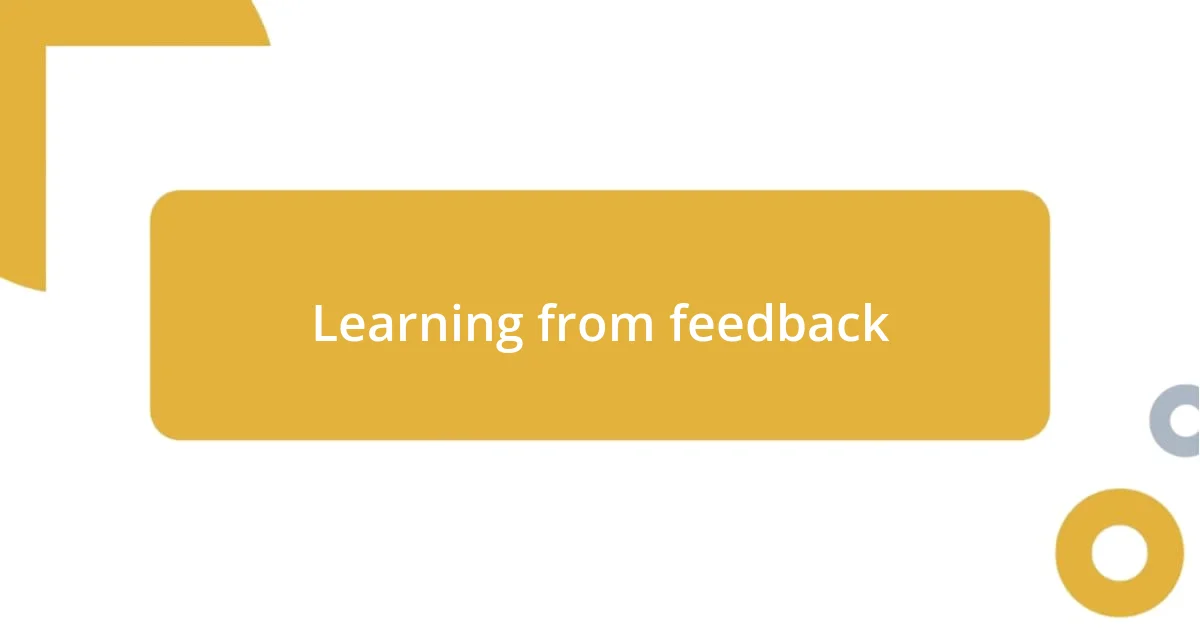
Learning from feedback
Feedback can be a powerful tool for growth, especially in a hands-on job like cleaning. I vividly recall my first week; a client gave me some constructive criticism about how I cleaned their kitchen countertops. Initially, I felt a little defensive, thinking I had done a good job. But then I took a step back and realized this was a chance to improve. The next time, I paid closer attention to the details, which really elevated my work and left the client not just satisfied, but genuinely impressed.
What surprised me the most was how open clients were to sharing their thoughts. I remember one client mentioned preferences for the types of products I used. I hadn’t considered that before. It was an eye-opening moment that taught me the importance of communication. Adjusting my methods based on their feedback not only improved my service but also built a rapport with clients. This became a meaningful part of my cleaning routine—asking for their input to create a more tailored experience. Isn’t it fascinating how feedback can shape the way we approach challenges?
Receiving feedback isn’t just about improving skills; it’s also about fostering relationships. I recall a moment when a client expressed gratitude for how I had re-organized their cleaning schedule based on their needs. It made me realize how impactful listening and adapting can be. Instead of viewing feedback as criticism, I learnt to embrace it as an opportunity for dialogue and connection. Have you ever noticed how a small shift in perspective can turn a daunting task into a collaborative effort? That’s exactly what it did for me.
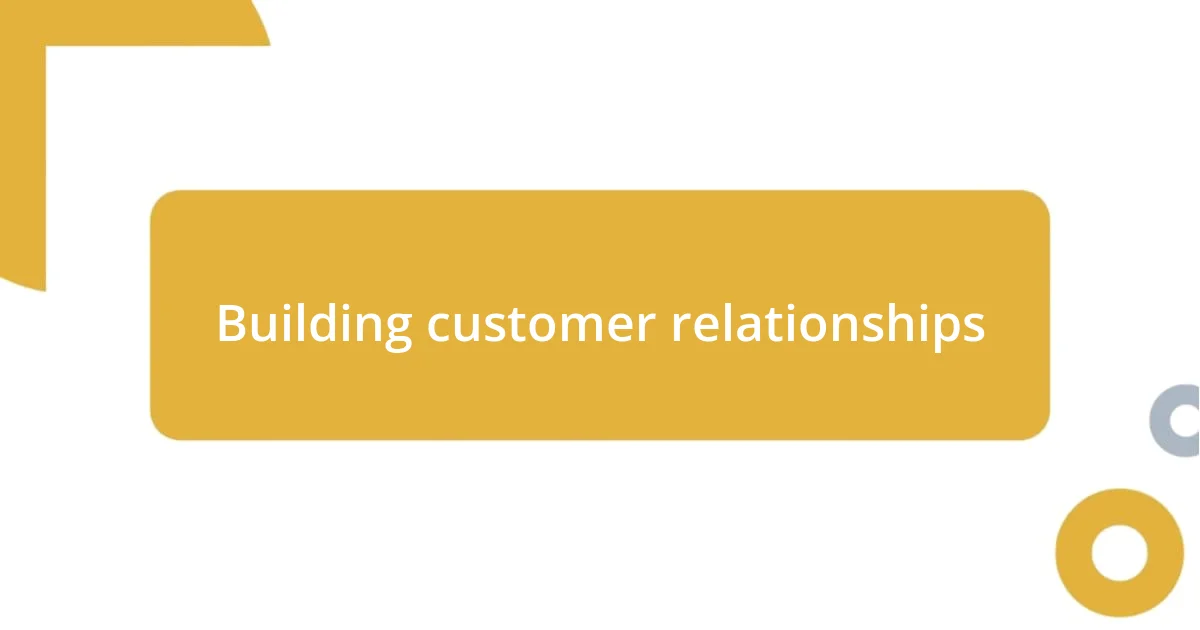
Building customer relationships
Building strong relationships with clients was one of the most rewarding aspects of my first cleaning job. I remember one particular day when I arrived at a client’s home, and she greeted me with a warm smile and homemade cookies. It struck me how small gestures like that not only made me feel appreciated but also fostered a sense of trust. Isn’t it incredible how personal connections can add a special touch to a professional relationship? I quickly learned that showing genuine interest in my clients—like remembering their names or asking about their day—could transform a simple transaction into a friendship.
Another lesson I discovered was the power of consistency in building customer bonds. I recall a client who booked me weekly because they loved how I took the time to go the extra mile. I started noticing the little things—like fluffing their couch cushions and arranging decor just so. Each time I returned, it felt like I was not just a cleaner but a trusted part of their home. Have you ever considered how small, thoughtful actions can create lasting impressions? It really made me realize that consistency and attention to detail can elevate a service from satisfactory to exceptional.
However, the most important relationship-building tip I learned was to always maintain open lines of communication. Once, a client expressed concern about the schedule; they were overwhelmed with work and needed a bit more flexibility. Rather than brushing it off or getting defensive, I made it a point to listen. I adjusted our cleaning times to better fit their needs, and the client was overjoyed. This experience taught me that genuine listening could turn potential misunderstandings into opportunities for growth. Isn’t it amazing how a little empathy can lay the foundation for enduring friendships?
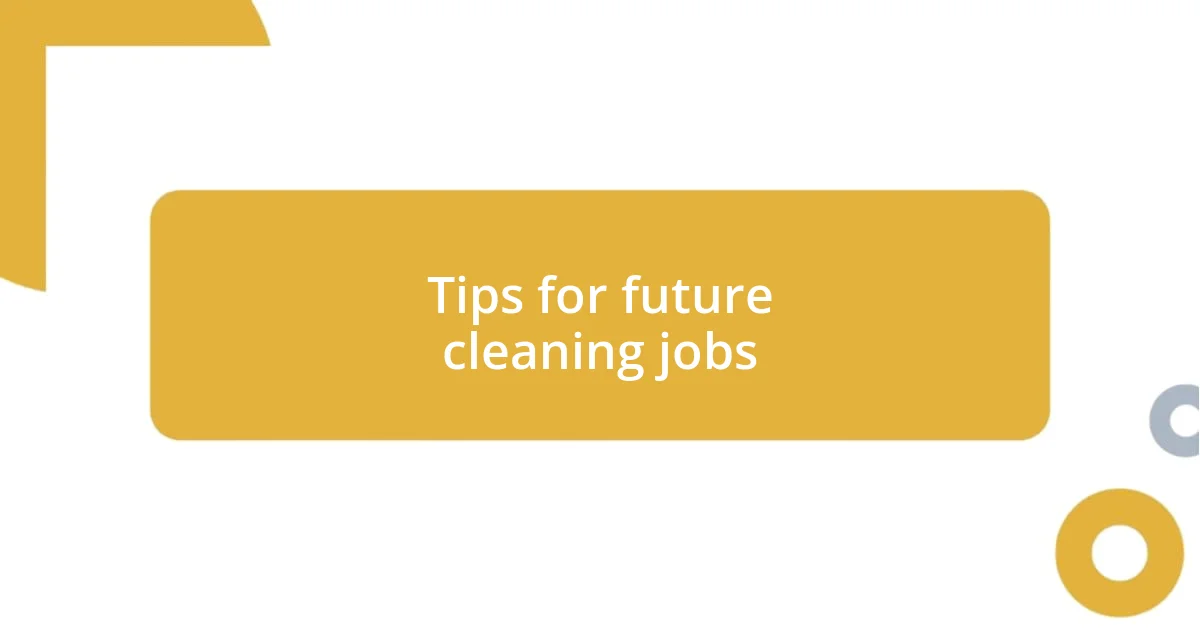
Tips for future cleaning jobs
When I think about my future cleaning jobs, one key tip that stands out is to organize my cleaning supplies in a way that makes them easily accessible. I remember countless times fumbling through a cluttered basket, trying to find a specific cleaner while a timer was ticking down. Now, I always categorize my products by task and make sure they’re neatly arranged. Have you ever felt the frustration of searching for something in a mess? Keeping my supplies organized not only saves time but also helps me work more efficiently.
Another valuable lesson I learned is the importance of setting realistic expectations with clients. There was one time I assured a client that I could clean their entire home within two hours, only to find myself scrambling to finish. It quickly became apparent that I had overpromised and underdelivered. Now, I always offer a clear estimate of how long each task should take based on past experiences. How often have you had to rush through work simply because you didn’t communicate properly? By being upfront about timeframes, I’ve found that clients appreciate my honesty, which builds trust and leads to long-term relationships.
Lastly, I can’t stress enough the value of self-care after a long day of cleaning. I used to power through my shifts without considering the toll it took on me. One evening, I collapsed on my couch, exhausted and drained, realizing I hadn’t given myself a moment to recharge. Now, I make it a point to celebrate a job well done by taking time for myself after work. Whether it’s enjoying a hot bath or diving into a good book, I’ve found that these little rituals rejuvenate me. Have you noticed how self-care impacts your performance? Taking care of myself means I can give my best to my clients, and that’s a win-win.










